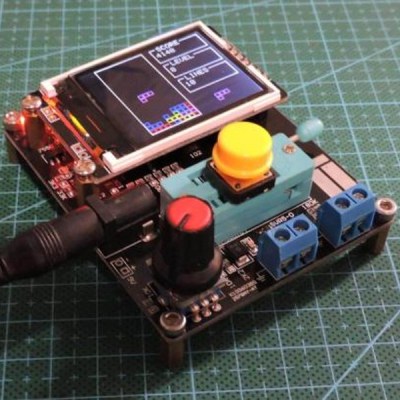In the art world, it’s often wistfully said that imitation is the sincerest form of flattery. In the open-source hardware world, this flattery takes the shape of finding your open-source project mass produced in China and sold at outrageously low markups. Looking around on my lab, I’ve been the direct beneficiary of this success.
 I see an AVR Transistor Tester that I picked up for a few bucks a long time ago. Lacking anything better, it’s my go-to device for measuring inductance and capacitor ESR. For $7, it is worth much more than I paid for it, due to some clever design work by a community of German hackers and the economics of mass production. They’re so cheap that we’ve seen people re-use them just for the displays and with a little modification, turned them into Tetris consoles. That’s too cool.
I see an AVR Transistor Tester that I picked up for a few bucks a long time ago. Lacking anything better, it’s my go-to device for measuring inductance and capacitor ESR. For $7, it is worth much more than I paid for it, due to some clever design work by a community of German hackers and the economics of mass production. They’re so cheap that we’ve seen people re-use them just for the displays and with a little modification, turned them into Tetris consoles. That’s too cool.
Microcontroller boards? My go-to is the “Blue-Pill” style STM32F103 breakouts, which cost nearly the same as the processor itself in small quantities. But these are clones of one of the first non-Atmel Arduino-compatible boards: The Maple Mini. Leaf Labs stopped making the boards, but with the designs out there and the price of the middle-aged microcontrollers dropping, it’s a huge win for hackers. I just bought a multi-protocol remote control for RC airplanes. I could have made one myself by sourcing parts and whipping up a PCB, but why? It’s cheaper to buy one pre-built, and I got a nice plastic case for free. My current 3D printers are a ripoff of the Prusa i3 design and a kit-built Prusa Mendel. The former cost less than a fourth as much as the latter, although the results are about the same. Why? Chinese mass manufacturing of open-source designs. I could go on for days.
It’s noteworthy that the folks who did the initial design work for all of this don’t get paid this way, and that bums me out. But of the aforementioned projects, only two were ever manufactured and sold by their originators. I’ve talked with Andrew Meyer of Maple Labs, and he said that he’s happy that they got cloned: the margins on the hardware were nothing compared with their design service income, and the benefit of having a bazillion Maples out there keeps their libmaple library well maintained by the community without requiring more of their resources. I know Joe Prusa isn’t a huge fan of “clone” competition, but he’s continuing to do what got him into the scene anyway — innovating — and that keeps their business running and expanding.
(The Mendel was actually a kit of Joe’s that he helped me assemble at a weekend workshop back in 2011 so I’ve paid him off directly anyway, and I just donated €5 to Pascal’s RC project too. My conscience is clear on these examples.)
Bigger businesses like Sparkfun and Adafruit can afford to be cloned because what they’re really selling is innovation, education, and documentation. Plus customer service and logistics and all the rest of the business of business. And for that, they earn a well-deserved markup. (See Nate Seidle’s great talk on the matter from 2016.) But doing all that “business” is a lot of work, and for a hacker with a few good ideas, getting the idea out there and getting it cloned is probably the easiest path to getting the goods into as many hands as possible, and making the project better.
Would the Transistor Tester ever have sold hundreds of thousands of units if left to the original hackers? I think not. And not every project is a mass-market project either. There are tons of interesting designs being sold in small quantities by the hackers who originated them, and I’m stoked to be able to buy them directly whenever possible. (Insert plug for Tindie, Hackaday’s sister company, here.)
But to those of you out there who have had the honor of being mass-cloned and ending up in my tool drawer, I salute you. And that’s the sincerest form of flattery coming from my hacker heart. I’ll buy you the beverage of your choice when we meet.
No comments:
Post a Comment